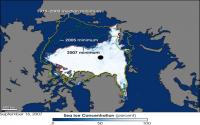News: Most Popular

Senator Ben Cardin of Maryland, argues that with China rejecting the UNCLOS tribunal's ruling regarding their South China Sea claims, it is time for the U.S. to lead by example and ratify UNCLOS to help preserve the global maritime rule of law.
[ More ]
Although the United States participated in the negotiations that culminated in the United Nations Convention on the Law of the Sea (UNCLOS), which came into force in 1994, it has not yet ratified the treaty. While it is true that the U.S. recognizes UNCLOS as a codification of customary international law, failure to become a signatory to the Treaty is increasingly harmful to American political, military, and economic interests.
[ More ]
The South China Sea has become the most dangerous fault-line in the world. Beijing and Washington are on a collision course over these contested waters, the shipping lane for 60pc of global trade.
[ More ]
Leading legislators from both parties welcomed today’s UN tribunal ruling against Chinese claims in the South China Sea. But while Republicans focused on China’s misdeeds, Democrats consistently brought up an American omission: The United States has never ratified the very treaty empowering the tribunal to stand up China, the UN Convention on the Law of the Sea.
[ More ]
How China reacts to the sweeping legal defeat over its claims to the South China Sea will tell the world a lot about its approach to international law, the use — measured or otherwise — of its enormous power, and its global ambitions. So far, the signs are troubling. Beijing has defiantly rejected an international arbitration court’s jurisdiction over a case brought by the Philippines and insisted it will not accept Tuesday’s pathbreaking judgment.
[ More ]
The United States should ratify the United Nations Convention on the Law of Sea (UNCLOS) in the wake of Manila’s victory over Beijing in The Hague-based Permanent Court of Arbitration (PCA) says one senior Democratic lawmaker. The United States—which acts as the guarantor of the liberal-institutional world order—is notably absent from the treaty—much to the chagrin of executive branch officials.
[ More ]
The authors argue that the stakes for the U.S. in preserving a rules-based maritime order and checking China's aggression in the South China Seas are too high for it to continue to remain outside of UNCLOS.
[ More ]
The author argues that U.S. diplomatic capacity to influence China in the South China Seas has been damaged by U.S. refusal to ratify UNCLOS, the very treaty it is asking China to abide by.
[ More ]
As climate scientists nervously watch the Arctic and high latitudes this summer — fearing how 2016’s record warmth could push the delicate system — two new pieces of data showing record rates of Arctic warming are hardly consoling.
[ More ]
A scientific expedition has been launched from the UK to explore the mining of rich metal deposits on the deep ocean floor, which are the focus of a new gold rush around the world.
[ More ]